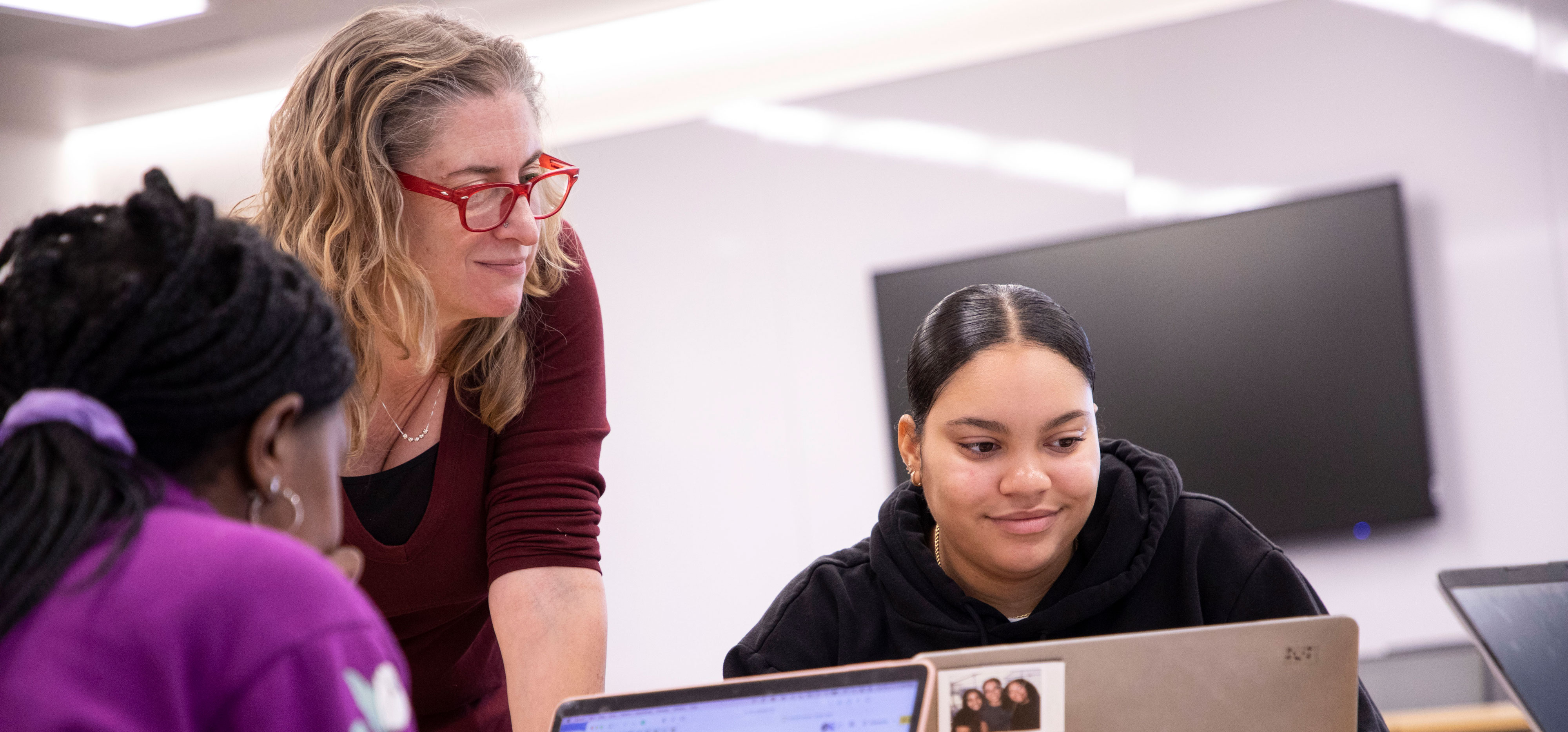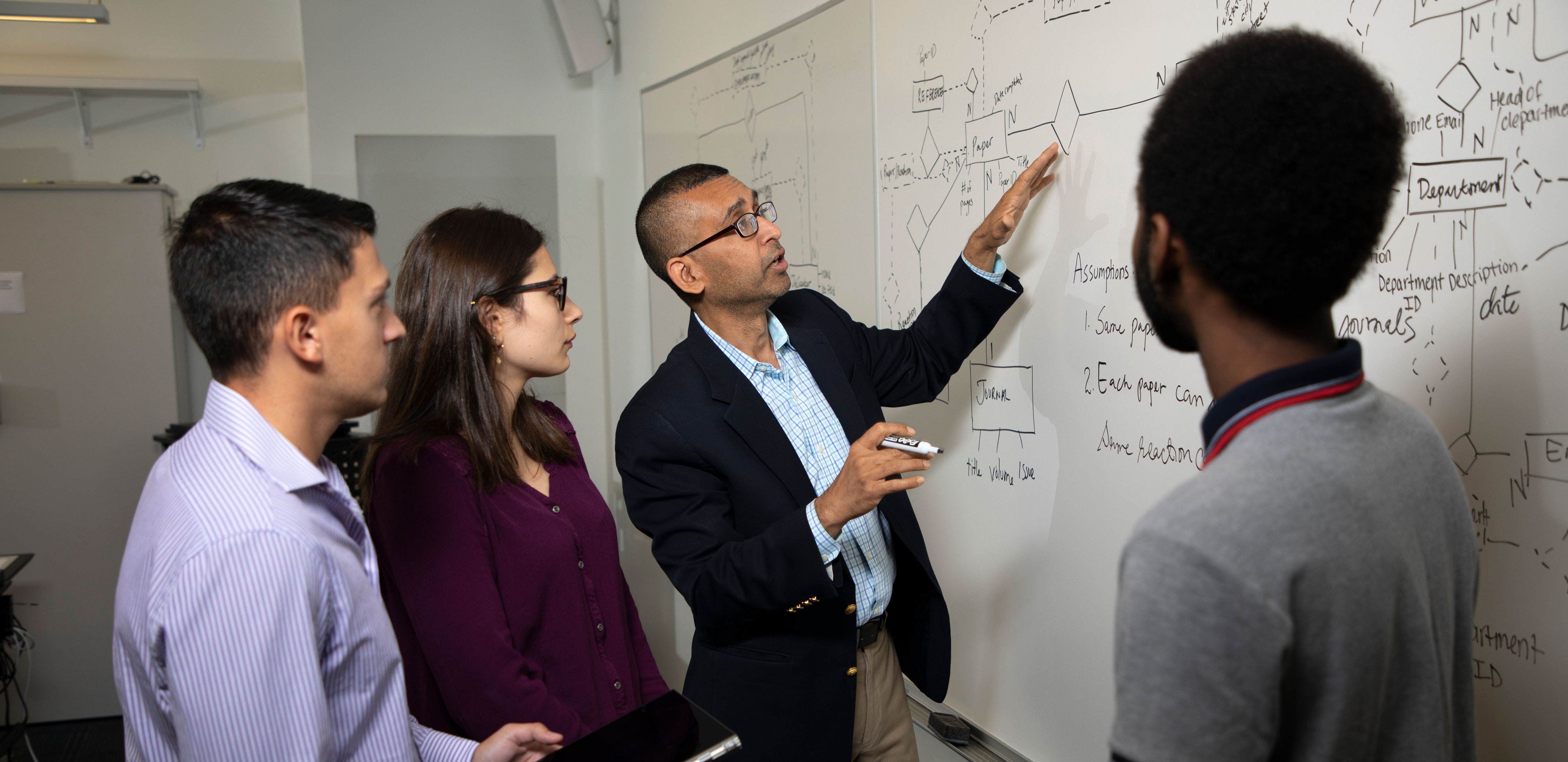A Community of Practice for STEM Instructors
The Equity and Excellence in Education (E3) Provost Fellowship is a professional community of practice award for UAlbany STEM instructors, designed to enhance instructional practices and improve teaching and learning experiences for both instructors and students.
The E3 Provost Fellowship will:
- Foster collaborative exploration of inclusive teaching
- Provide multiple avenues of teaching support
- Focus on the practical work associated with teaching at a diverse, research-intensive University
Through participation in the fellowship, instructors will:
- Examine collective and individual conceptions of inclusive teaching and learning, as well as their impact on student learning and classroom culture
- Use research-based practices in classroom instruction and course design
- Engage in routine and systematic reflection based on student work and feedback
- Build a community of colleagues supporting effective and equitable teaching
- Incorporate practices that have been shown to improve outcomes for all students, including but not limited to increases in graduation rates, retention within STEM majors and an increase in a sense of belonging
Fellowship Sponsors, Partners & Research
The E3 Provost Fellowship is sponsored by the Office of the Provost and the Howard Hughes Medical Institute (HHMI) EXCELlence in STEM grant.
The fellowship is based, in part, on research and materials from the Student Experience Project (SEP).
SEP is a collaborative of university leaders, faculty, researchers and national education organizations committed to innovative, research-based practices to increase degree attainment by building equitable learning environments and fostering a sense of belonging on campus.
The SEP collaboration includes the Association of Public and Land-Grant Universities (APLU) and Coalition of Urban Serving Universities (USU).
The E3 Provost Fellowship includes partners from across UAlbany’s campus:
- Office of the Provost
- Division of Inclusive Excellence
- Office of Academic Innovation and Student Success (OAISS)
- Center for the Advancement of Teaching, Learning, and Online Education (CATLOE)
- School of Education
2024 Equity and Excellence in Education Provost Fellows
- Mustafa Aksoy, Electrical and Computer Engineering
- David Ardrey, Electrical and Computer Engineering
- Jeffrey Braunstein, Electrical and Computer Engineering
- Gabriele Fuchs, Biological Sciences
- Linda Mayerhofer, Biological Sciences
- Jonathan Muckell, Electrical and Computer Engineering
- Sujata Murty, Atmospheric and Environmental Sciences
- Cara Pager, Biological Sciences
- Michael Phipps, Computer Science
- Elise Vogt, Biological Sciences
- Benjamin Yankson, Cybersecurity
- Weilan Zhang, Environmental & Sustainable Engineering
2025 Equity and Excellence in Education Provost Fellows
- Nathan Dahlin, Electrical & Computer Engineering
- Stephanie DeSouza, Biological Sciences
- Jeremy I. Feldblyum, Chemistry
- Angel Ford, Information Sciences and Technology
- Aubrey Hillman, Atmospheric & Environmental Sciences
- Michael Leckzinsky, Information Sciences and Technology
- Muntasir Masum, Epidemiology & Biostatistics
- Luciano Medina, Mathematics & Statistics
- Hannah Shorrock, Biological Sciences
- Elizabeth Vásquez, Epidemiology & Biostatistics
- Tara Yasenchak, Mathematics & Statistics, Educational Opportunity Program
What are fellows saying about the program?
“This fellowship has been the most enriching professional development opportunity I have ever participated in while at UAlbany. I loved learning and discussing pedagogical strategies supported by evidence-based research.
Our discussions and meetings always felt like a safe space to explore new ideas, ask questions and challenge ourselves to grow. I am thrilled to continue this work over the next two years!”
— Sujata Murty, Atmospheric & Environmental Sciences
“E3 did many things for me. One, it made me think critically about my teaching, what is going right and wrong and what I can do about it. Two, it gave me a lot of evidence-backed research on what works and what doesn't that I could draw from to improve my course.
Three, it made me think hard about some of those students who might disappear quietly and how I can serve them better. Finally, it gave me a cohort of colleagues who I know by name, respect and can work with on teaching materials without fear or embarrassment."
— Michael Phipps, Computer Science
Program Overview
The E3 Provost Fellowship is designed as a community award to cultivate relationships among STEM instructors at UAlbany.
The fellowship spans two academic years with the option to participate in a third. The first year begins in late August, a couple months after that cohort’s application deadline.
Note: Specific dates and other details will be shared with fellows via email.
Year 1: Evidence-based Inclusive Teaching Practices
Description:
During the first year, fellows will engage in a cohort-based First-Year Institute.
Each session will introduce inclusive teaching principles rooted in social psychology, education and learning sciences research that have been shown to boost student engagement, increase equity in academic outcomes, and support student learning and success in STEM courses.
Fellows will collaboratively explore these principles as well as practical and effective implementation techniques that can be applied in the classroom.
Throughout the year, fellows will identify small shifts to make in their courses, test them out where possible and establish methods for systematically (self-)examining their impact (i.e., how will I know it “worked”?).
The First-Year Institute will take place in person, on campus, beginning in late August, followed by 12 sessions held during that academic year. Meeting dates and times will be determined after fellows have been selected to accommodate teaching schedules.
Meetings will be interactive and will include time for fellows to work on specific aspects of their course materials in the company of STEM colleagues and experts across campus.
Learning Objectives:
By the end of Year 1, fellows will be able to:
- Identify research-based practices to promote student engagement, increase equity in students’ experiences of their learning environments and support academic success
- Adapt inclusive practices to their teaching context
- Collect and analyze formative student feedback to make iterative refinements
Program:
- Orientation & Kick-Off (refreshments provided)
- First-Year Institute:
- Fall: Six 90-minute sessions held twice monthly from September to November
- Spring: Six 90-minute sessions held twice monthly from February to April
Outcomes:
- Four to six pedagogical “lab notebook” submissions
- Collection of formative feedback from students
- Mini portfolio of teaching materials
Fellows who submit the materials above and attend all sessions of the First-Year Institute will receive recognition of participation. Fellows are encouraged to contact the facilitators if personal or scheduling conflicts arise to identify appropriate accommodations.
Year 2: Course Design & Inclusive Teaching
Description:
The fellowship's second year will focus on a larger course (re)design effort through student learning and inclusion.
Fellows will first participate in a five-day STEM Course Design Academy (typically held a couple weeks after Commencement) to (re)design a course they will teach in the fall semester of year two.
After completing the STEM Course Design Academy, participants will continue to develop their course design with support from a Center for the Advancement of Teaching, Learning, and Online Education (CATLOE) consultant through one-on-one consultation.
Fellows will receive continuous support as they develop assessments, learning sequences, classroom activities and documents such as their syllabus and welcome letter.
Fellows will also benefit from peer support by meeting regularly during the fall semester for a series of Inclusive Course Design and Teaching “Brown Bags” to discuss their experiences implementing their course design.
Throughout the spring semester, fellows will have the option for continued support from an instructional consultant as they develop their ideas about and implementation of inclusive teaching.
Learning Objectives:
By the end of year two, fellows will be able to use research-based principles to:
- Design an inclusive course that supports student learning, growth mindset and sense of belonging
- Design course documents that support student learning, growth mindset and a sense of belonging in the course and the discipline
- Design and facilitate a structured class meeting that effectively engages students in their learning using principles of inclusive teaching
- Identify and implement strategies to address teaching challenges, particularly those related to student persistence, engagement and equitable outcomes
Program:
- STEM Course Design Academy (mid-May of year one; five sessions, typically held from 10 a.m. to 3 p.m. with lunch provided)
- Fall: Six 60-minute Inclusive Course Design & Teaching “Brown Bag” sessions
- Spring: Individual meetings and check-ins as needed, and E3 Provost Fellows Celebration & Showcase
Outcomes:
- (Re)designed course, course documents and class meeting plan based on inclusive pedagogical practices
- Reflective planning on inclusive teaching practice
- Collection of formative feedback from students
- Presentation of fellowship activities
Fellows who complete the above and attend all program meetings will receive recognition of participation. Fellows are encouraged to contact the facilitators if personal or scheduling conflicts arise to identify appropriate accommodations.
Optional Year 3: Expanding Inclusive Teaching & Supporting the Community
Description:
Interested fellows may choose to take the lead in designing a mini project, with a focus on how inclusive teaching practices can be deliberately interwoven into their disciplinary expertise and research.
Third-year fellows will be eligible to apply for internal funds to support a range of activities, including but not limited to:
- Providing and receiving ongoing mentorship support
- Working on collaborative projects that center inclusive pedagogical techniques
- Developing proposals for external grant applications that require integration of education and research or implementing proposed projects
- Participating in and/or conducting classroom observations
- Creating subgroups with areas of interest
- Updating additional courses
- Creating inclusive STEM modules
- Opportunities for additional professional development
Guidance will be provided to ensure that fellowship projects can be reasonably completed within the academic year.
Learning Objectives:
By the end of year three, fellows will be able to:
- Use their continually developing expertise to support themselves and other colleagues engaging in course and teaching (re)design and refinement
- Engage in project-based work or other opportunities to incorporate inclusive teaching practices into their areas of disciplinary expertise and research
Outcomes:
- Third-year fellowship mini project
Additional Benefits:
- Eligible to apply for internal grant funds to support mini project
- Designation of Distinguished Equity and Excellence in Education (E3) Provost Fellow

Fellowship Benefits
In recognition of their efforts and leadership, instructors who successfully complete the fellowship will:
- Receive $1,500 stipend in each year of the fellowship (Years 1 and 2)
- Receive letters of recognition from the Office of the Provost and Division of Inclusive Excellence
- Receive a fellow designation from the Office of the Provost
- Work with an undergraduate student pedagogy assistant to support course development and/or in-class teaching (Year 2)
- Be eligible to apply for funds to support inclusive teaching mini projects (Optional Year 3)

Apply to the E3 Provost Fellowship
The fellowship is open to UAlbany STEM faculty and lecturers teaching undergraduate courses.
E3 Provost Fellowship Applications are due by June 20, 2025. Space is limited.
Fellows will be notified about their selection in July and their cohort will begin meeting in mid-August.
Questions?
For questions or other assistance, please contact Lakia Green at [email protected] and Sarah Pickett at [email protected].


